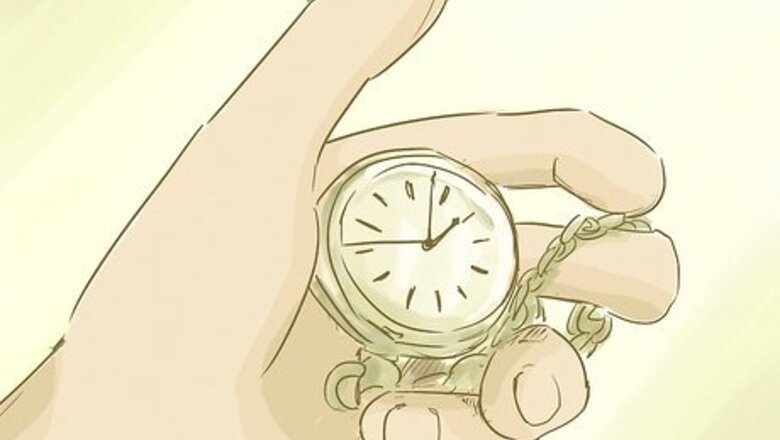
views
Voicing Your Concerns
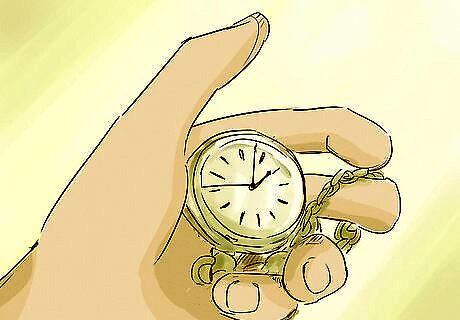
Choose a time when you won't be interrupted. When approaching a friend or loved one about their eating disorder, pick a time when there will be no distractions. This will let them know that they have your undivided attention and that you are committed to helping them. Plan to speak to them on a day when neither of you has any appointments or other engagements. Avoid having this discussion after an argument or when they are in a bad mood. Choose a time and place where you know you will have privacy to talk.
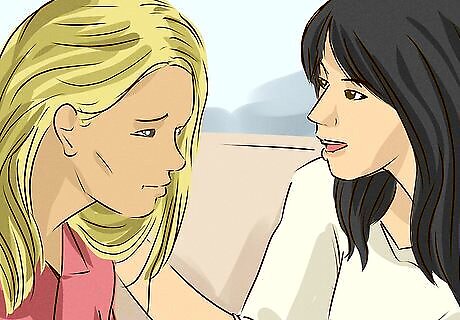
Explain why you are worried about them in a calm manner. Expressing your concerns in a state of alarm will add stress to the situation and may scare the person away. Speak gently and outline some of the things you have observed that make you believe they might have a problem. Make it clear that you care for them and only want to make sure that they are okay. For instance, say something like, "I'm concerned that you don't seem to be eating much lately and that you are losing a lot of weight."

Introduce anorexia into the conversation in a stigma-free way. The person you are confronting will likely feel a great deal of shame about their condition, which will make it difficult for them to hear the word "anorexia." Start the conversation by asserting that eating disorders are nothing to feel guilty or embarrassed about. Let them know that many people struggle with anorexia and recover from it. You could say, "I know that the word "anorexia" can be scary to hear, but you're not alone. Many people have lived with this disorder and managed to beat it."

Show your friend videos and photos of anorexia. Some people may not realize that they have a problem. Using videos of other people who had anorexia and recovered can help them realize what anorexia looks like. Ask your friend if they would be willing to go to a support group for people with anorexia. This can help them face their problem and learn about the condition from others in a similar situation.

Prepare yourself for a negative reaction. It is almost certain that voicing your concerns to your friend will cause them to act defensively or get upset. Remember that this is normal and not a personal attack on you. Try to keep your emotions in check by reminding yourself that denial is a part of the disease and that you are doing the best you can to help. Stay calm while they react to your concerns to avoid letting the conversation escalate into a fight. Let them know that you understand their reaction by saying something like, "I would feel just as upset as you if I were in your position right now."
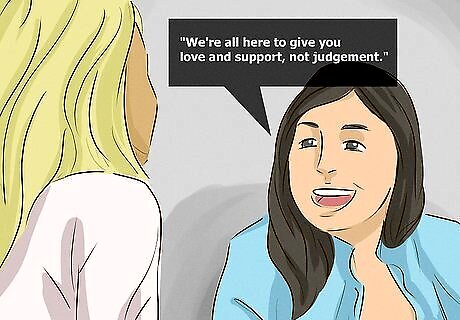
Stage an intervention with other people if there is imminent danger. In serious cases, anorexia can lead to cardiac arrest, electrolyte imbalance, and death. If you fear that your friend or loved one's condition has progressed to a dangerous point and want backup to confront them, stage an intervention. Ask other concerned parties to attend and voice their concerns in a united front. Start by making a statement like, "We're all here to give you love and support, not judgement." Be sure that everyone keeps a firm but gentle tone to avoid making the person feel ambushed.
Encouraging Them to Get Help
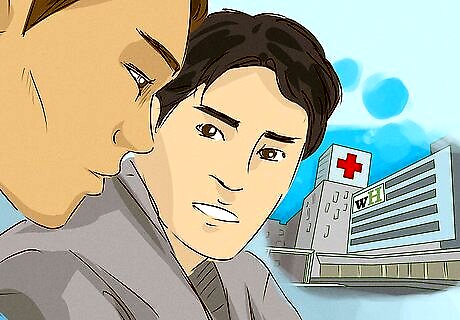
Offer to take them to the doctor. It is important to make sure that someone suffering from anorexia is medically stable. Malnutrition can cause damage to their entire body and have irreversible effects over time, such as infertility and organ damage. Tell your friend or loved one that you will accompany them to see a doctor and suggest going as soon as possible. A doctor will likely run a variety of tests, including blood work and a physical examination. Hospitalization may be necessary if the patient is perceived to be in imminent danger.
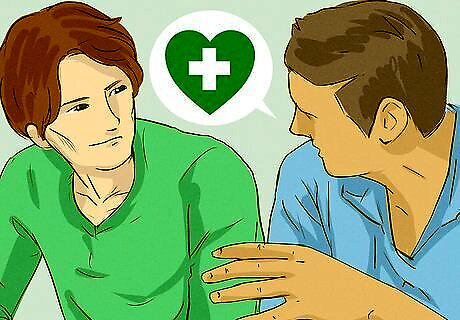
Encourage them to attend treatment to help their recovery. Therapy is a crucial part of an anorexic person's recovery and will usually be recommended by their doctor. Encourage your friend or loved one to talk to their doctor about the different therapy options available to determine which one would be the most beneficial. Therapies commonly used to treat anorexia include: Cognitive behavioural therapy (CBT), where a doctor will help you create a plan for coping with the emotional and practical parts of recovery. Maudsley Anorexia Nervosa Treatment for Adults (MANTA), which involves getting to the root of what is causing your anorexia. Specialist supportive clinical management (SSCM), which involves understanding your anorexia and learning more about nutrition and eating habits. Focal psychodynamic therapy, which involves mapping out how your eating habits relate to your life and rethinking them.
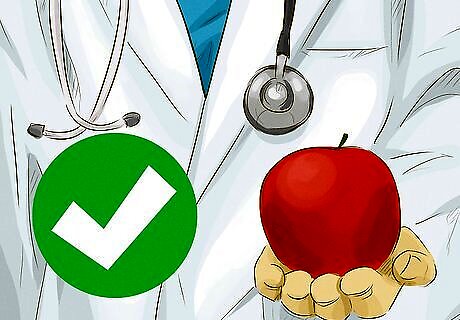
Recommend that they see a registered dietitian for nutrition therapy. Nutrition therapy involves learning about what your body needs from food and building healthy eating habits. This type of treatment is an important step in normalizing eating patterns while recovering from an eating disorder. Suggest that your friend make an appointment with a registered dietitian as a regular part of their healing process. Offer to look up registered dietitians in the area and focus on finding a specialist with experience with eating disorders.
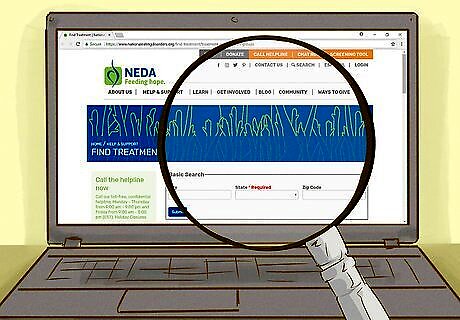
Help them locate treatment in their area. Take some stress away from your friend or loved one during their recovery process by offering to help them find treatment. If they have financial restrictions, help them find treatment with sliding scale or installment payment options. You can also search for treatment that covers underlying issues such as depression and anxiety. Search for different treatment options in your area by visiting the National Eating Disorder Association's website.
Avoiding Common Pitfalls

Educate yourself about anorexia. There are many preconceived notions about anorexia that can affect how people view someone with the disease. Free yourself from that kind of misinformation by reading articles or books from credible medical sources. Knowing more about anorexia will better equip you to help someone dealing with it. For instance, research will make it clear that anorexia is a lot more complex than vanity or a simple desire to lose weight.
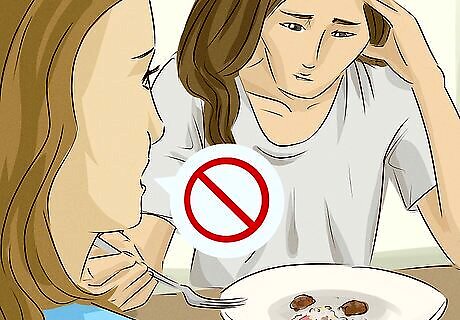
Avoid policing their behaviour. Recovering from anorexia is an inner journey that takes time and reflection. While it is important to make sure that your friend or loved one is not endangering themselves, it can be damaging to watch them too closely. Stop yourself from monitoring their food intake or responding negatively to their behaviour. For instance, do not make a negative comment if they only eat half of their meal.
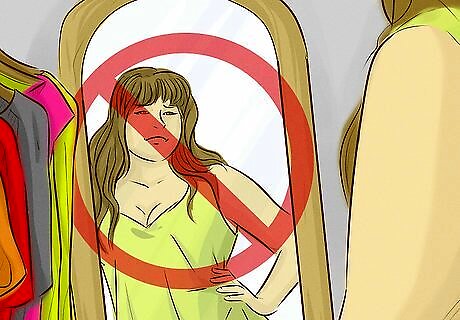
Don't make negative comments about your body or anyone else's. There are many body shaming norms in our society that are internalized and integrated into daily life. It is fairly common for people to say self-critical things without giving it much thought. Try to be mindful of this tendency and avoid making self-deprecating or outwardly critical comments about physical appearance. Any phrase like, "I'm so fat" or "she's really let herself go" should be avoided as they reinforce rigid beauty standards.
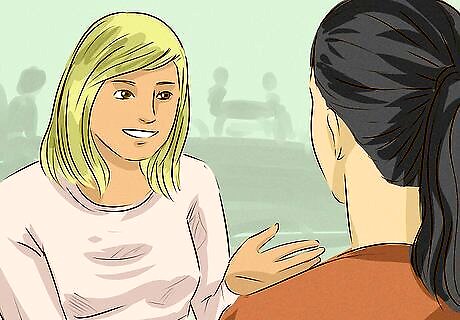
Confide in someone you trust to help keep your emotions in check. Dealing with a friend or loved one's illness can be an upsetting and daunting task. If you feel overwhelmed or unsure about how to proceed, speak to a trusted advisor, mentor, friend, or health professional for guidance. Respect the privacy of the person you are talking about by referring to them anonymously. Speaking about the issue may help you sort out your feelings so you can remain calm and composed when dealing with your friend or loved one directly.
Supporting Their Recovery
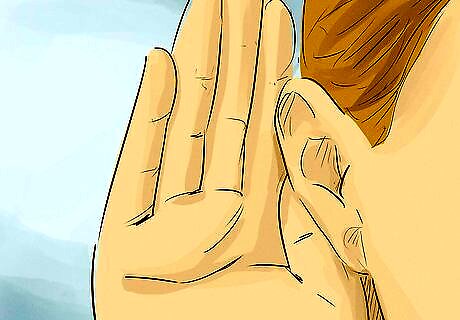
Make yourself available to listen whenever they need you. A simple but important way to support a friend or loved one recovering from anorexia is to make yourself available. Tell them that you are there for them and will listen whenever they want to talk. Be sure to listen without judgement so that they feel supported and safe confiding you.
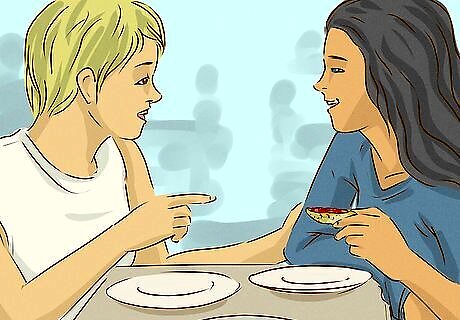
Offer positive reinforcement when they make positive changes. An anorexic person may struggle with their self esteem while they gain back much needed body weight. Help them overcome this by offering positive comments for their healthy behaviours. Tell them that you're proud of them and that they're making the best, healthiest choice. For example, say something like, "I'm so glad to see you eat that piece of pizza. Your body needs it and you're doing a great job of taking care of yourself!"
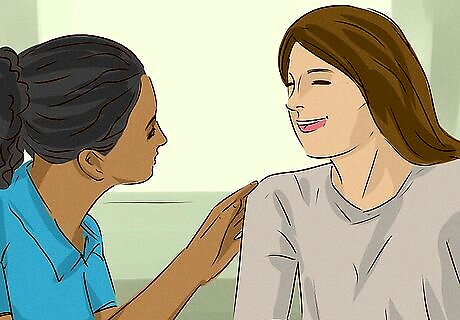
Praise their non-physical attributes. Help to build your friend or loved one's confidence by highlighting their inner qualities. Compliment them on their intellectual and emotional strengths to make them feel good. Avoid discussing their physical attributes, which will drag the focus back to issues of body image. For instance, you can praise their wittiness, courage, and kindness. People with anorexia may be suffering from low self esteem. Try to build your friend's self-esteem, not just by giving them compliments but by spending time with them. Be there when they need someone to support them.

Promote healthy eating practices through your own example. Help your friend or loved one's recovery from anorexia by making healthy choices when you are in their company. During shared meals, choose nutritious foods in sufficient proportions. Do not restrict your food intake, discuss diet plans, or express regret at your eating choices. For example, choose full meals with healthy ingredients like vegetables, whole grains, and healthy protein. Avoid saying negative things like, "I'm so bad for pigging out like this!"













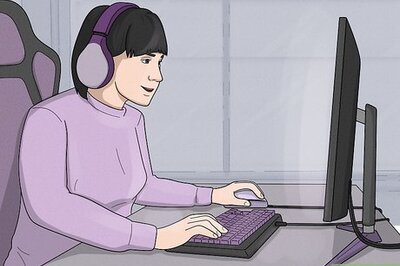


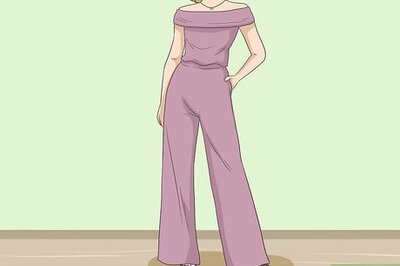
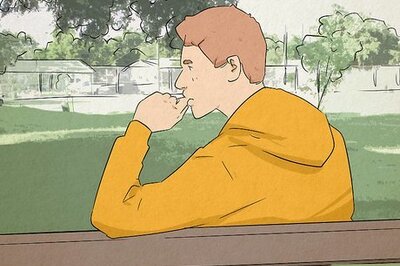

Comments
0 comment